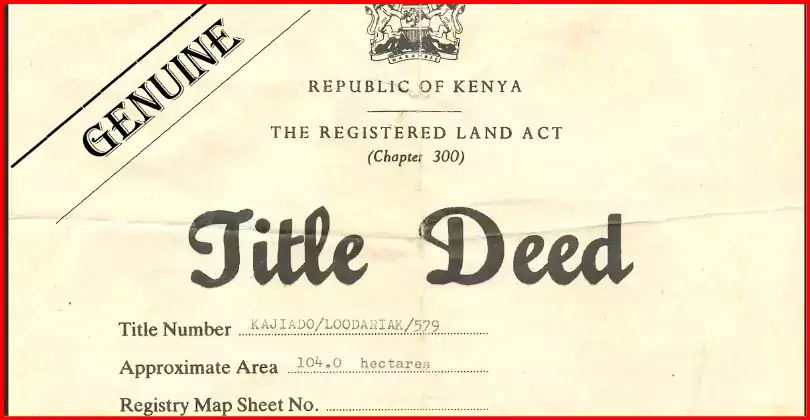
Purchasing a plot of land, may it be a small cozy home or a sprawling estate, entitles you to a single document which is so much more than a piece of paper, it's a Title Deed. These questions might cross our minds, but what is the true definition of What Is A Title Deed, and why is it such a big deal? In this article, therefore, we are going to unravel very clearly in simplified language the meaning of Title Deeds.
A Title Deed, which is also called a deed of title, is a legal certificate marking ownership of the real estate. It comprehends basic information about the property, for example, its legal description, location, and names of current or previous owners. Think of it as the certificate of authenticity for your property - it documents and records the history of your possession.
Proof of Ownership: A title deed has a lot of significance, as it is used to define and establish ownership rights. Without a Title Deed, you won’t have an instrument to reliably demonstrate your right of possession.
Legal Protection: Title Deeds protect one’s interest as they act as the legal proof of ownership that is not subject to any disputes. In case of any defiance of your incorruptible ownership over the property, you can prove it in court by presenting a title deed which is your undeniable ownership evidence.
Transfer of Ownership: The title deed, which is transferred along with the property when a sale or property transfer is made. Thanks to that, the new owner gets to have some legal evidence that the property belongs to him/her.
Mortgage and Loans: Whenever you stand guarantor of a mortgage using your property as security, the lender keeps your Title Deed until you have made full repayment of the advance loan. This, on the part of the lender, provides a security measure.
Property Description: This part consists of the introduction of the property, including its boundaries, size, and location. Most of the time, it consists of a legal description that precisely indicates the property.
Ownership Information: The Title Deed is usually the document that lists the present owner(s) of the property together with the list of the previous owners. This will also reveal the property whether through purchase, inheritance, or gift.
Encumbrances and Liens: Encumbrances are any charges or limitations imposed on the property that, for example, could be a mortgage, an easement or any liens. The stipulation clause will reveal any encumbrances detrimentally affecting the property’s title.
Title Guarantee: Some Title Deeds have the title guarantee attached, assuring that the seller is in a position to sell the property and that his/her title has no undisclosed liabilities or defects.
During the closing procedure, you should expect to take possession of your Title Deed, which is legal proof of ownership. Your lawyer or a title company will facilitate the transfer of a Title Deed and will ensure that it has been formally recorded with an appropriate government agency, such as the Recorder's Office.
If you've been building up equity in your property by repaying a mortgage or a loan, a Title Deed will be sent directly to you from your lender. In case you do not have your concrete proof of ownership, you can apply for your Title Deed from the government office which normally requires a processing fee of a small amount.
While Title Deeds offer sufficient security to the property owners, still these are not issue-free instruments.
Fraudulent Transfers: Sometimes people do the “title washing” fraudulently, for example, they forge a Title Deed or use some other trick. The Title Deed's acceptability as proof of ownership also depends on its authenticity verification.
Clouded Title: It is indicated as a clouded title when a conflict or confusion exists as to who owns the property and/or what kinds of obligations are linked to it. The cause can be traced back to the flaws in the Title Deed, overlapping claims of heirs or creditors, and unfinished issues of law.
Unrecorded Documents: In case a former owner did not have key documents registered like a deed or discharge of mortgage, then challenges may crop up for the current owner. It's also essential to ensure that every single document is duly filled with the proper authorities. Also, learn about several real estate technology trends.
A Title Deed is an instrumental legal document that guarantees the title of ownership and the protection of property rights. The knowledge of the purpose and parts of What Is A Title Deed gives owners the ability to cover their belongings as well as solve any (difficulties) that may arise. Whether you're a buyer, a seller, or a simple property owner, having a clear idea of your Title Deed is key to feeling relaxed.


